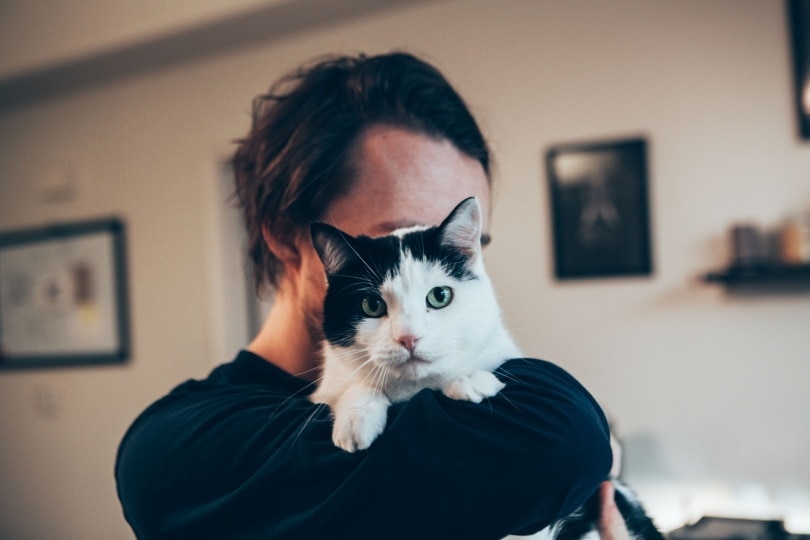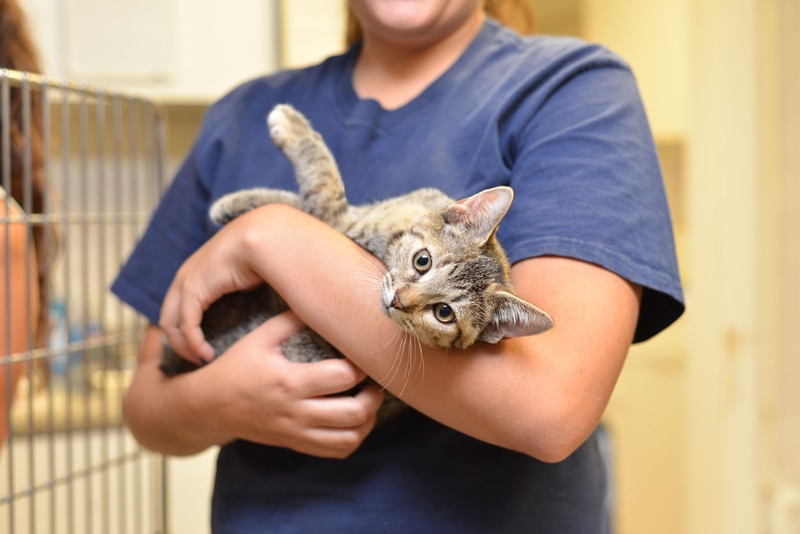Is It OK Confining a Cat to a Room at Night? Vet-Reviewed Facts & Considerations

Updated on

Click to Skip Ahead
In the course of one night, a cat can get up to a great deal of mischief. As long as they don’t keep you awake, though, this usually isn’t a problem. Every so often, however, you might wake up to find a mess of epic proportions or get disturbed by something shattering in the middle of the night. If this happens enough, you might start wondering whether shutting your cat away for the night is safer for both your cat and your house.
It’s okay to confine your cat to a room at night, but you do have to prepare the room properly. Your cat needs to be comfortable with the size of the room, and they need access to food, water, and a litter tray. Most of all, the room needs to be safe and well-ventilated and kept at a stable temperature.
This guide will help you understand when you might want to confine your cat and how to make sure your cat is happy with the arrangement.
Is It Cruel to Confine a Cat to a Room at Night?
Provided that you make sure your cat is comfortable being confined to a room and they have access to everything that they need, it’s not cruel to confine them to a room. In fact, it’s sometimes a necessary thing to do, especially if you’re in the middle of renovations and the rest of the house is unsafe or your cat is recovering from an injury, for example.
Confining your cat to a room on their own can be stressful, though. Never shut in your cat all night right from the start (unless of course, your cat doesn’t mind). For most cats, you’ll find it best if you introduce the new routine slowly and never when your cat is stressed about being locked away.
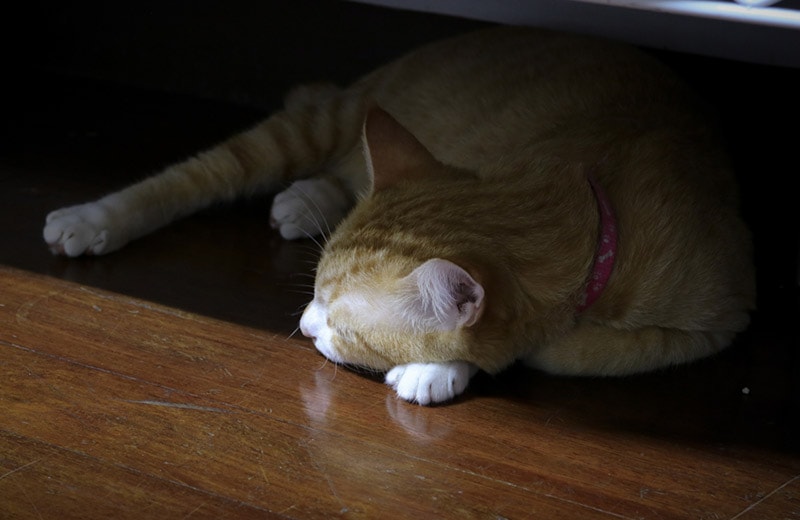
Things to Consider When Confining a Cat to a Room at Night
When you follow a few important tips, it’s safe to confine your cat to a room at night. You do have to consider all the dangers, though, and make sure the room is suitable. This list contains everything that you need to plan for in order to keep your cat as comfortable as possible when you keep them in one room overnight.
1. Enrichment, Food, Water, and Litter
Confining your cat to a single room is fine, but they still need access to their resources. You can’t shut them away without access to clean water or their litter tray. Both items are essential whether they have the run of the house or are kept in one room. In addition, if your cat has access to their toys, a cat tower, their scratching post, and a favorite resting bed, they will likely take a liking to the room.
The inclusion of food in an overnight room is controversial, as your cat may readily overeat while left to their own devices. You should however make sure that your cat has eaten before you place them in their own room for the night. This also allows you to welcome them with a treat when you eventually let them out of the room the next day, and therefore, they may consider this routine as a positive experience.
If your cat is using a room as a recovery room, or an isolation room, then you’d likely want to provide food for them. Kittens have a lower tolerance for hunger than adult cats due to their higher metabolism and lower fat reserves and therefore, might need food to sustain themselves for a night in a room by themselves.
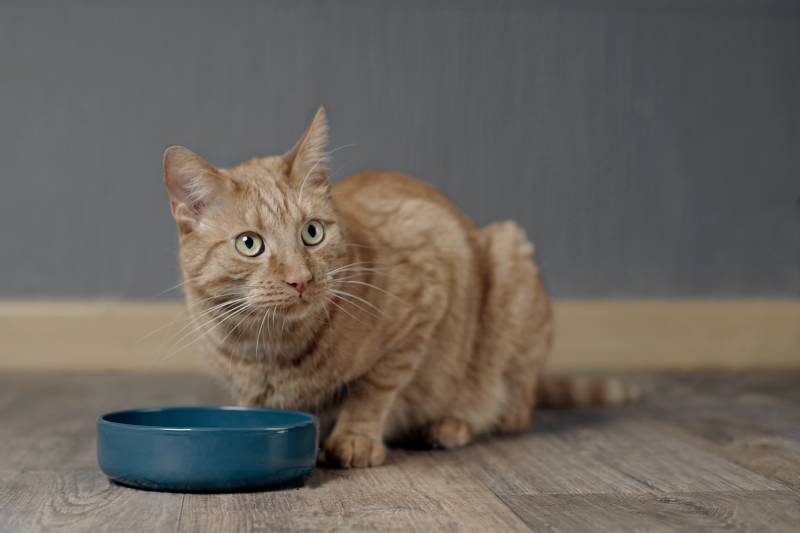
2. Personality
Many cats don’t like to be shut into a small room, especially if they’re used to having the run of the house. More active cats are likely to be the ones with the biggest problem about being locked up. They’ll feel trapped if they’re shut away for too long and will be more prone to depression, boredom, or anxiety.
However, some cats won’t have a problem with the arrangement. If they’re quiet or lazy, they’ll likely find the most comfortable spot in the room and sleep the night away. Start with short sessions with your cat confined in the room to see how they cope. If they show distress at any time, you’ll need to reconsider your options.
3. Room Size
The smaller the room is, the more trapped your cat may feel. Cats love to explore, and they need more space than you might think to practice their hunting skills, investigate their surroundings, and play.
Generally speaking, an outgoing cat will be happier the more space they have. If the only spare room in your house is a small closet in the hallway, for example, confining your cat inside won’t be acceptable to such a cat. A rather timid cat may appreciate a smaller room, however, it is worth investigating why they’re acting as such, as sometimes, cats resort to self-isolation and hiding when they’re unwell or stressed.
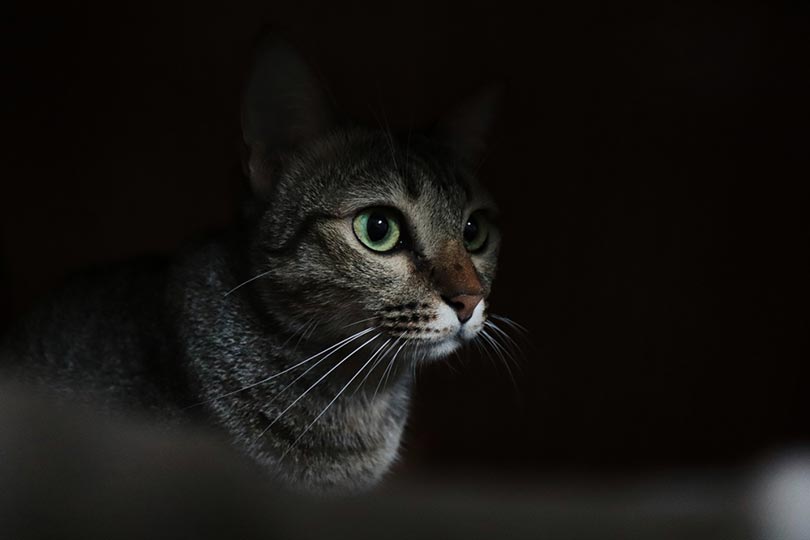
4. Safety
Most of all, the room that you confine your cat to needs to be safe. It’s no use keeping them out of the kitchen, away from all the knives, if there are exposed wires or breakables in the room.
While you’re ensuring that your cat’s room is comfortable and has everything that they need, also check for potential hazards. This means removing any cleaning products, medications, electrical wires, appliances, air fresheners, diffusers, or toxic plants that might be in there before turning it into a cat room.
5.Ventilation
Even at night, closed rooms can quickly get stuffy, and cats can get uncomfortable in stale air just like we do. Your cat room needs to be well-ventilated, whether it has a window or not. This will help keep the air fresh and your cat comfortable. If the room has a window, ensure your cat cannot escape from the room.
Ventilation will also help remove odors and prevent your cat from developing respiratory problems due to limited air flow. An air purifier can help, as can opening the window during the day or setting up an exhaust fan.
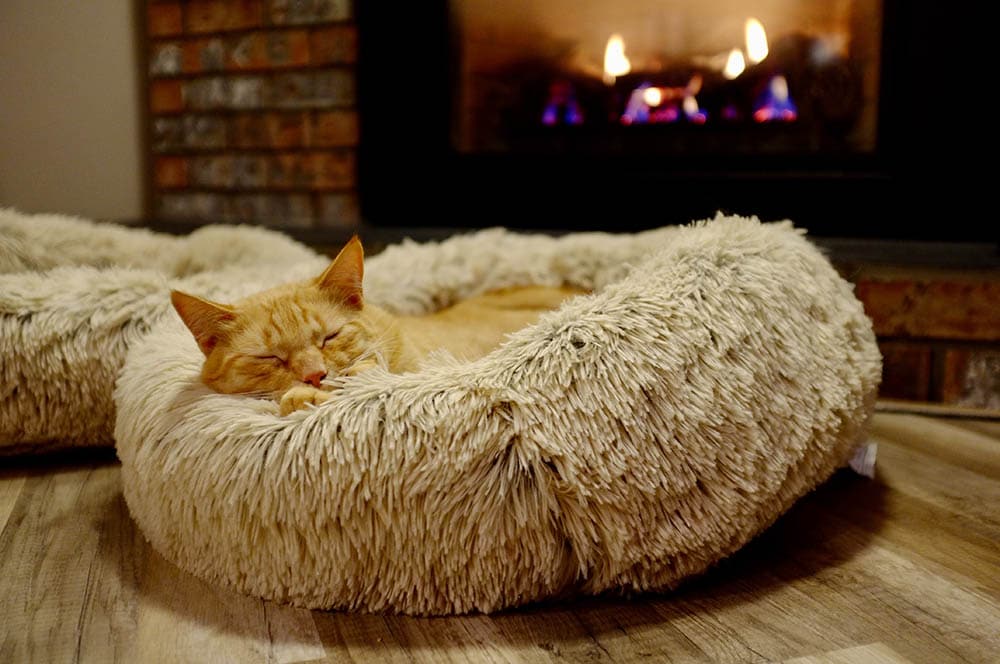
6. Temperature
A shut room can get very hot or very cold, depending on the season. Either can be unpleasant for your cat and lead to issues like heatstroke, dehydration, or hypothermia. You need a way to control the temperature in the room that you choose for your cat.
The perfect room temperature for a healthy adult cat with a fur coat is about 70°F (21 °C). Cats that lack a coat (such as the Sphynx, or a cat that had their coat shaved), cats that are unwell, seniors, kittens, or cats that are underweight or overweight might not have as good temperature tolerance. It is therefore necessary to offer them areas of warmth (such as a blanket, or a warm bed) as well as areas where they can go if they feel too warm (such as an area where the floor is tiled).
When Is It Necessary to Confine Your Cat at Night?
Not all cats need to be confined to a single room at night, and most of the time, it isn’t necessary. That said, there are occasions when confining your cat to a room is required for safety or health reasons. Here are common reasons that you might want to confine your cat.
- They’re elderly, disabled, or young (please note: some of these cats may need food while being isolated).
- They’re home alone.
- You’re introducing a new cat to your home.
- You want to promote their healing from illness or injury.
- You want to prevent your cat from escaping (for example, a female cat in heat may actively seek escape routes to find a mate).
- You want to prevent the spread of parasites, infection, or disease (quarantine).
If you do confine your cat at night, always make sure to let them out as soon as you get up the next morning. Your cat shouldn’t be confined for days on end. In addition, confinement should not be used as punishment and the presence of toys in their room isn’t an acceptable substitute for human interaction.
When Should You Not Confine Your Cat at Night?
While there are plenty of reasons that you might want to confine your cat at night, there are also many reasons that you shouldn’t:
- When they’re stressed
- No temperature control or ventilation
- If the room is too small
- No access to water, enrichment, or the litter tray
- As a punishment
If your cat isn’t comfortable being on their own or the room isn’t safe, you should find another solution to managing their nighttime activities.

Can You Let Your Cat Wander the House at Night?
Although cat rooms are relatively common, it’s also acceptable to let your cat wander the house at night. You can restrict their access to certain rooms if they’re dangerous or just make sure nothing is lying around that your cat can hurt themselves. As a general rule, it’s best to prevent access to the kitchen or laundry room, and any room where you place household cleaning supplies. Remember to check that all the outer doors and windows are shut tight to prevent escapes, and your cat will be fine.
Giving your cat access to the entire house might give them more opportunities for mischief, but it also gives them more freedom. They can explore as much as they like, play around, have free access to resources, and find a comfortable spot to nap in.
If your cat is prone to attacking you while you sleep, you can consider shutting your bedroom door to keep them out. They’ll still have the rest of the house to explore while you sleep.
Conclusion
If your cat is fine with being confined to a room at night, it’s okay to do so. In fact, it’s often recommended when you bring home a new cat or if they’re sick or recovering and need to be kept isolated. You do need to make sure the room is suitable, though.
Cats need plenty of space to explore and play, along with easy access to food, water, and a litter tray. The room should also be well-ventilated with temperature control. With the right approach, your cat will be safe and happy in their cat room while you’re asleep.
Featured Image Credit: mariavp, Pixabay



